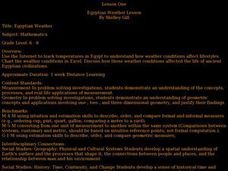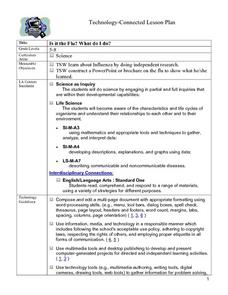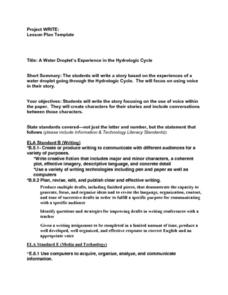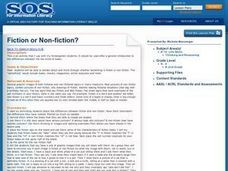Curated OER
Awesome Alliterations
Students review examples of alliteration in Shel Silverstein's poems. They are assigned a letter of the alphabet and then write an original alliterative poem using that letter.
Curated OER
Amazing Adjectives
Fourth graders compose sentences that use descriptive adjectives to describe a specific food and day that they both like and dislike. They should really enjoy coming up with words that describe their favorite and least favorite foods!
Curated OER
Egyptian Weather Lesson
Students chart temperatures in Egypt on spreadsheet to determine how weather conditions affect lifestyles.
Curated OER
The Art of Paraphrasing
Tenth graders participate in an activity in which they practice paraphrasing sections of primary and secondary documents. They are to share their paraphrasing with the class to help with their confidence speaking in front of a group.
Curated OER
Writing A Business Letter Who, What, and Where Are They
Seventh graders word process business letters using proper tab settings, spell checking, grammar and punctuation. They use the Internet to search for names and addresses.
Curated OER
Learning New Words
Students, working in groups, make as many words as possible in a given time, using flash cards that contain prefixes, words, and definitions. They chose group roles and participate in a numbers of time rounds of this activities.
Curated OER
Periodic Poetry
Students review periodic table of elements, choose one element, and create piece of poetry about it using Cinquain, Haiku, or Acrostic format. Students then read aloud their poems to classmates.
Alabama Learning Exchange
Using an Almanac
Students work cooperatively in order to identify specific situations in which an almanac is the best choice for locating information. They answer specific questions, record the page on which the answer was found, and the key words used...
Curated OER
Being a Good Detective
Students examine a variety of reference resources when seeking information. They discuss atlases, almanacs, dictionaries, encyclopedias, thesauri, online search engines for the Internet, and online library card catalogs. They complete a...
Curated OER
Simplifying sentences
Learners read through several articles as a class and identify key words in sentences. Students work as a class to reduce the length of the article by shortening the sentences but ensuring that they still make sense.
Curated OER
Direct Speech
Students explore characteristics of a good speech. They use speech marks to demarcate direct speech. Students read a report and rewrite it, using verbs that describe people speaking.
Curated OER
Is It The Flu? What Do I Do?
Learners use the internet to research the flu. Using various websites, they identify who should get flu shots, how to protect themselves and guidelines for getting over the flu. They write a one page report on their findings to end the...
Curated OER
Colonial Research Fun
Young scholars review the characteristics of the thirteen colonies. In groups, they use the internet to research one of the colonies more in depth and answer questions about it. They develop a newspaper or travel brochure to share the...
Curated OER
Common/Proper Nouns
Students sort word card into two categories (common and proper nouns). They copy the class charts. Students create a table in Word including the headings, common noun and proper noun. They put the correct words onto their chart and add a...
Curated OER
Fall Similes and Metaphors
Students interpret what a similies and metaphors are. They give examples of similies and metaphors. Pupils write different similies and metaphors using fall or autumn descriptive words. Students base their comparisons on facts, once they...
Curated OER
Zulu King, Zulu King
Learners listen to story Brown Bear, Brown Bear, brainstorm everything they know about Mardi Gras, create pages relating to Mardi Gras for class book, type information on computer, play slide show, and take turns reading their books.
Curated OER
Hopi Culture: Parts of the Corn
Pupils identify the parts of the corn stalk in English and Hopi. They discuss the significance of corn to the Hopi culture, and examine a diagram of the corn stalk. They discuss the purposes of the parts of the corn stalk, then label a...
Curated OER
A Water Droplet's Experience in the Hydrologic Cycle
Students write a story from the perspective of a water droplet on a journey through the water cycle. They use the 6+1 Traits writing method to focus on voice in the writing as they create characters that their water droplet has...
Curated OER
Fiction or Non-fiction
Third graders view three texts, A DAY IN THE LIFE OF A FOOTBALLER, THE HUMAN BODY, AND WHICH IS WHICH? with the titles covered. They discuss whether the books are non-fiction or fiction and try to come up with suitable titles for the books.
Curated OER
Conventions and Proofreading
Students explore and apply their proofreading skills in order to prepare their project essays for peer editing and final drafting. They refine their final project essays by identifying and correcting spelling and grammatical errors.
Curated OER
Vocabulary Builder- Using Inspiration to Generate Lists of Descriptive Words
Students discover how to engage all their senses and powers of observation to effectively communicate and idea or emotion. Using Inspiration Software, they create a vocabulary web and practice using descriptive language to clarify and...
Curated OER
The Poet's Message-"The Colored Soldier" by Langston Hughes
Young scholars analyze the poem, "The Colored Soldier" by Langston Hughes to gain a greater experience of how poets use language to create meaning, influence thinking and thus become pioneers of change in American society. They work on...
Curated OER
Nouns
Students recognize common nouns and proper nouns and use them in proper paragraph form. They get the opportunity to play noun bingo. In addition, diagramming simple and compound noun sentences are undertaken within this lesson.
Curated OER
The Crucible
Young scholars participate in a layered curriculum unit. Credit is earned for learning, which comes about through listening, discussion, reading, and/or doing. They are verbally assessed for each activity chosen to complete.
Other popular searches
- Thesaurus Worksheets
- Using a Thesaurus
- Dictionary and Thesaurus
- Thesaurus Skills
- Using Thesaurus
- Thesaurus and Synonyms
- Using the Thesaurus
- Thesaurus Lessons
- Thesaurus Lesson Plans
- Visual Thesaurus
- Lesson on Thesaurus
- Thesaurus Use

























